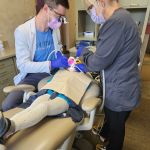How to Handle Common Dental Emergencies: Expert Advice and Tips
Dental emergencies can happen at any time, often when we least expect them. Whether it’s a sudden toothache, a chipped tooth from a fall, or a severe tooth injury, it’s crucial to know how to act quickly. As someone who has faced a dental emergency personally, I can tell you that knowing the right steps to take can make all the difference in how effectively the situation is handled. In this article, I will share practical advice and tips on how to deal with the most common dental emergencies.
1. What to Do If You Have a Sudden Toothache
There's nothing more uncomfortable than a toothache that strikes out of nowhere. If you're dealing with throbbing pain, it's important to remain calm and take the right steps to alleviate it. Here's what you can do:
- Rinse with warm water: Gently rinse your mouth with warm saltwater to clean it and reduce swelling.
- Use over-the-counter pain relievers: Ibuprofen or acetaminophen can help manage the pain, but always follow the dosage instructions carefully.
- Avoid putting pressure on the affected tooth: Don't chew on the side where the tooth hurts.
- Cold compress: Applying a cold compress to the outside of your cheek can help numb the pain and reduce swelling.
- Visit your dentist as soon as possible: A persistent toothache may indicate an underlying issue such as an infection, so it’s important to get a professional evaluation.
2. How to Manage a Knocked-Out Tooth
Accidents happen, and if you or someone you know experiences a knocked-out tooth, it’s vital to act fast. The chances of saving the tooth are highest if you seek dental help immediately. Here’s what you should do:
- Pick up the tooth carefully: Hold it by the crown (the top part) and avoid touching the root.
- Clean the tooth (if possible): If the tooth is dirty, rinse it gently with water. Do not scrub or use soap.
- Reinsert the tooth into the socket (if possible): If you can, try placing the tooth back into the socket. Bite down gently to keep it in place.
- Store the tooth properly: If reinserting the tooth is not possible, store it in a clean container with milk or saliva. Avoid using water, as it can damage the root.
- Get to the dentist: The sooner you see a dentist, the higher the chances that your tooth can be saved. Aim to see a dentist within an hour of the injury.
3. Dealing with a Cracked or Chipped Tooth
A cracked or chipped tooth is another common dental emergency, often caused by biting something hard, an accident, or trauma to the mouth. Here's how to manage it:
- Rinse your mouth with warm water: Clean the affected area to prevent further irritation or infection.
- Apply a cold compress: A cold compress can help reduce pain and swelling if there is any associated injury.
- Use over-the-counter pain relievers: Take medication as needed to manage pain, but avoid placing aspirin directly on the gum or tooth.
- Visit your dentist: Even if the crack or chip seems minor, it's important to have a dentist evaluate it. Depending on the severity, you may need a filling, bonding, or other treatment to restore the tooth.
4. Handling a Lost Filling or Crown
If you lose a filling or crown, it can leave the affected tooth vulnerable to further damage and discomfort. Here's how to handle it:
- Keep the filling or crown: If you can find the lost piece, keep it safe. You may be able to have it reattached.
- Use temporary dental cement: Over-the-counter dental cement can be used to temporarily seal the tooth and protect it until you see a dentist.
- Avoid chewing on the affected tooth: To prevent further damage, avoid chewing on the tooth where the filling or crown was lost.
- Visit your dentist: You’ll need to have the filling or crown professionally replaced. If the tooth is in danger of decay, your dentist will provide a more permanent solution.
5. Dealing with a Bitten Lip or Tongue
In some dental emergencies, soft tissue injuries like a bitten lip or tongue can occur. These injuries are often the result of a fall or a blow to the face. Here’s how you can manage it:
- Clean the area: Gently clean the wound with water to remove any debris.
- Apply a cold compress: To reduce swelling and ease pain, apply a cold compress to the injured area.
- Stop the bleeding: If the bleeding persists, apply gentle pressure with a clean cloth or gauze until it stops.
- Seek medical help: If the bleeding doesn’t stop or the injury is severe, seek medical attention immediately.
6. When to Visit the Emergency Room
In some cases, a dental emergency might require immediate attention beyond what a dentist can provide. If you experience any of the following, it’s important to visit the emergency room:
- Severe facial swelling
- Bleeding that won’t stop
- Fractured jaw
- Serious head or neck injuries
In these situations, it’s crucial to act quickly to prevent further complications. After receiving emergency treatment, follow up with your dentist to address the dental aspect of the injury.
7. Prevention: Protecting Your Teeth from Emergencies
While accidents can happen, there are steps you can take to reduce your risk of a dental emergency:
- Wear a mouthguard: If you play sports or engage in high-risk activities, wearing a mouthguard can protect your teeth from impact and trauma.
- Practice good oral hygiene: Keeping your teeth and gums healthy can help prevent issues like tooth decay or gum disease, which could lead to emergencies.
- Be cautious with hard foods: Avoid chewing on ice, hard candies, or other items that could damage your teeth.
While it’s impossible to predict when a dental emergency will occur, being prepared can help you handle the situation with confidence. Knowing what to do and when to seek professional care is essential in protecting your dental health.







 Inverness Dental Care | Dr. Payal Trivedi5.0 (252 review)
Inverness Dental Care | Dr. Payal Trivedi5.0 (252 review) Axiom Dentistry4.0 (314 review)
Axiom Dentistry4.0 (314 review) Casady Square Orthodontics5.0 (851 review)
Casady Square Orthodontics5.0 (851 review) Mountainside Dental Group - Rancho Santa Margarita4.0 (117 review)
Mountainside Dental Group - Rancho Santa Margarita4.0 (117 review) Spring Lake Dental Arts4.0 (64 review)
Spring Lake Dental Arts4.0 (64 review) Southill Dental Group5.0 (364 review)
Southill Dental Group5.0 (364 review) The Importance of Oral Health Education During Pregnancy for a Healthy Pregnancy
The Importance of Oral Health Education During Pregnancy for a Healthy Pregnancy Best Tips for Brushing Your Teeth Properly for Healthy Gums: Essential Techniques for Oral Health
Best Tips for Brushing Your Teeth Properly for Healthy Gums: Essential Techniques for Oral Health Why Skipping Dental Checkups Can Lead to Bigger Oral Health Problems
Why Skipping Dental Checkups Can Lead to Bigger Oral Health Problems Advantages of Porcelain Dental Restorations
Advantages of Porcelain Dental Restorations How Can Diabetes Cause Tooth and Gum Problems? Preventing and Managing Oral Health Issues
How Can Diabetes Cause Tooth and Gum Problems? Preventing and Managing Oral Health Issues Healthy Habits for Promoting Good Oral Health and Hygiene: Tips for a Healthy Smile
Healthy Habits for Promoting Good Oral Health and Hygiene: Tips for a Healthy Smile